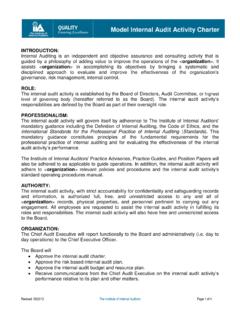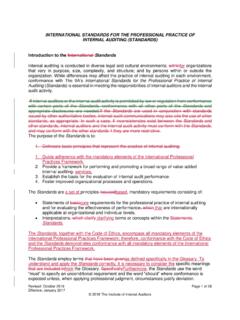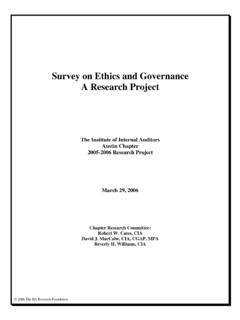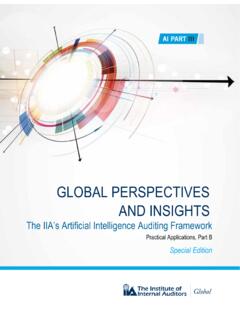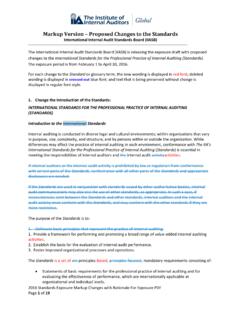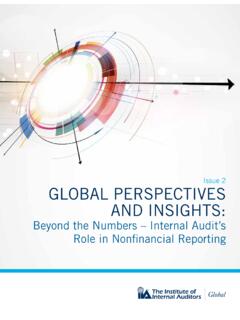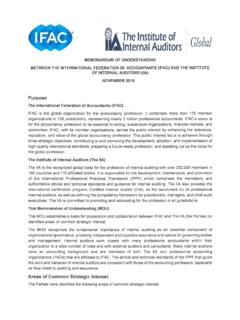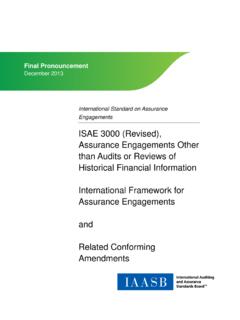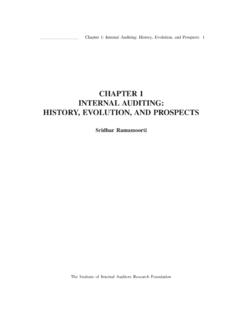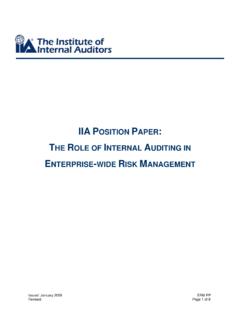Transcription of FRAUD AND INTERNAL AUDIT - global.theiia.org
1 IIA POSITION PAPER. FRAUD AND INTERNAL AUDIT . assurance Over FRAUD Controls Fundamental to Success Introduction KEY TAKEAWAYS. Every year billions of dollars are lost to FRAUD and corruption resulting in inefficiencies, aborted projects, financial challenges, organizational failure, and, in Organizations should have extreme cases, humanitarian disaster. Often FRAUD occurs because of poorly robust INTERNAL control designed controls and weak governance undermining the organization's processes. procedures to limit the risk of FRAUD , and INTERNAL AUDIT 's role is Organizations should have robust INTERNAL control procedures to limit the risk of to assess these controls. FRAUD , and INTERNAL AUDIT 's role is to assess these controls.
2 Fundamental FRAUD Facts The organization should have a suitable FRAUD prevention and FRAUD can be defined as any illegal act characterized by deceit, concealment, response plan in place allowing or violation of trust. These acts are not dependent upon the threat of violence or effective limitation and swift physical force. Frauds are perpetrated by parties and organizations to obtain response to the identification of money, property, or services; to avoid payment or loss of services; or to secure FRAUD and management of the personal or business advantage. situation. This should include digital data. FRAUD is not unique to any organization type. It occurs in public and privately owned businesses, not-for-profit, in organizations that seek to contribute to economic and social well-being, such as government departments, financial The chief AUDIT executive should institutions, and public and private utilities (water, electricity, education, health consider how the risk of FRAUD is care, etc.)
3 In short, the opportunity to commit FRAUD exists everywhere. managed across the organization and assess the FRAUD risk How organizations deal with the risk of FRAUD may be influenced by legal jurisdiction exposure periodically. and the organization's own risk assessment and appetite. FRAUD can often lead to litigation, dismissal, and recovery of assets. It is essential, The risk of FRAUD should be therefore, that any investigation is undertaken by suitably qualified individuals to included in the AUDIT plan and reduce the risk of compromising evidence, accusing wrongfully, or undermining each AUDIT assignment to prospective legal actions. evaluate the adequacy of anti- FRAUD controls. Consistent with The IIA's International Standards for the Professional Practice of INTERNAL auditing on proficiency ( ), INTERNAL auditors must have sufficient INTERNAL auditors should not knowledge to evaluate the risk of FRAUD and the manner in which it is managed by investigate FRAUD unless they the organization.
4 Have the specific experience and expertise required to do so. 1. The IIA's Perspective INTERNAL auditing is an independent, objective assurance and consulting FIVE QUESTIONS. activity designed to add value and improve an organization's operations. Its role includes detecting, preventing, and monitoring FRAUD risks and addressing Managing FRAUD risk is something those risks in audits and investigations. every organization faces. Governing bodies and executive It should consider where FRAUD risk is present within the business and respond management can help clarify appropriately by auditing the controls of that area, evaluating the potential for the roles in FRAUD risk management, occurrence of FRAUD and how the organization manages FRAUD risk including INTERNAL AUDIT 's role.
5 (Standard ) through risk assessment, and AUDIT planning. It is not INTERNAL AUDIT 's direct responsibility to prevent FRAUD happening within the business. This is Here are five key questions the the responsibility of management as the first line of defense. governing body should be asking: The INTERNAL auditor should not be expected to have the expertise of a person 1. whose primary responsibility is to investigate FRAUD . Such investigations are best Does the organization have a carried out by those experienced to undertake such assignments. FRAUD response plan in place that outlines key policies and INTERNAL AUDIT should use its expertise to analyze data sets to identify trends and investigation methodologies?
6 Patterns that might suggest FRAUD and funding abuse. Where the experience is not available within the INTERNAL AUDIT team, the organization should consider recruiting 2. or engaging resources with sufficient knowledge or expertise. Who carries out FRAUD investigations within the The organization should have a suitable anti- FRAUD response plan outlining key organization? policies and investigation methodologies. The plan should make clear the role of INTERNAL AUDIT when there is suspected FRAUD and associated control failure. 3. Is INTERNAL AUDIT tasked with Operationally, INTERNAL AUDIT should have sufficient knowledge of FRAUD to: identifying where FRAUD risk is present, and does it AUDIT Identify red flags indicating FRAUD may have been committed.
7 Controls in these areas? Understand the characteristics of FRAUD and the techniques used to commit 4. FRAUD , and the various FRAUD schemes and scenarios. When FRAUD has occurred, Evaluate the indicators of FRAUD and decide whether further action is does INTERNAL AUDIT investigate to understand how the controls necessary or whether an investigation should be recommended. failed and how they can Evaluate the effectiveness of controls to prevent or detect FRAUD . be improved? Where electronic evidence is collected, INTERNAL AUDIT should provide assurance 5. on whether necessary access rights and legislative requirements are being met. Is INTERNAL AUDIT tasked to investigate FRAUD , and, if so, does Where FRAUD has occurred, INTERNAL AUDIT should understand how the controls failed it possess the proper skill sets to and identify opportunities for improvement.
8 It should consider the probability of carry out such investigations? further errors, FRAUD , or noncompliance across the organization and reassess the cost of assurance in relation to potential benefits. Many factors, including available resources, influence how organizations respond to FRAUD . Some organizations include FRAUD awareness (proactive) and response (reactive) mechanisms within the INTERNAL AUDIT activity, and some INTERNAL auditors may investigate FRAUD . 2. If INTERNAL AUDIT is required to investigate FRAUD , the INTERNAL auditor should have the necessary skills and experience to undertake the investigation and discharge their professional responsibility without jeopardizing the investigation and Organizations should not associated evidence.
9 Expect INTERNAL AUDIT 's skill set to include FRAUD Investigation is not typically an INTERNAL AUDIT task; therefore, INTERNAL auditors should exercise due professional care (Standard 1220) by considering the extent investigation. Instead, INTERNAL of work needed to achieve the engagement's objectives and the related AUDIT should support the complexity, materiality, or significance. They should decide if they are best placed organization's anti- FRAUD to undertake the investigation or whether to engage INTERNAL legal counsel, human management efforts by resources, qualified or certified FRAUD examiners, digital forensics, or outside legal and investigative expertise. providing necessary assurance services over Conclusion INTERNAL controls designed to The threat of FRAUD is one of the most common challenges to governance detect and prevent FRAUD .
10 That organizations face without regard to size, industry, or location. Having proper INTERNAL control procedures in place that include an appropriate response plan is fundamental to battling FRAUD . INTERNAL AUDIT possesses intimate control knowledge of the organization. A combined assurance approach is key in this regard to understand the gaps in controls to allow for the manifestation of FRAUD . FRAUD investigations are best carried out by those experienced to undertake such assignments. Organizations should not expect INTERNAL AUDIT 's skill set to include FRAUD investigation. Instead, INTERNAL AUDIT should support the organization's anti- FRAUD management efforts by providing necessary assurance services over INTERNAL controls designed to detect and prevent FRAUD .
